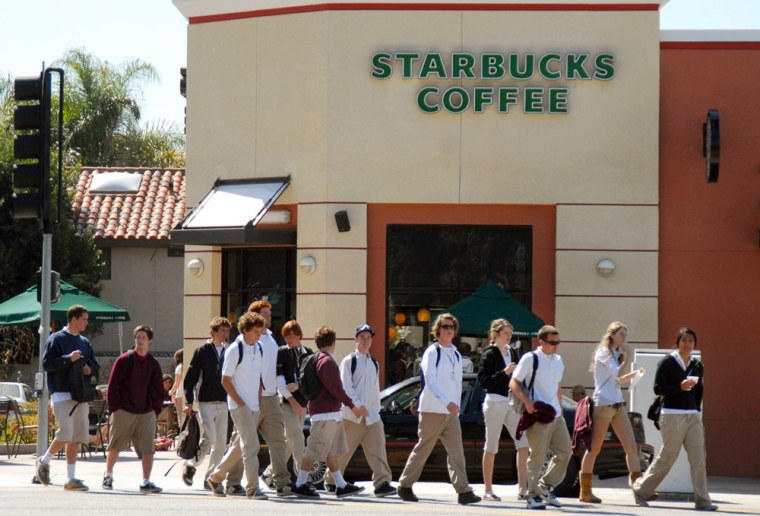Take a quick drive on a weekday morning through Needham, Mass., a typical suburban community outside Boston, and you'll see hordes of commuters queuing up for their morning joe. A Dunkin' Donuts that opened a few years ago along the main drag is the busiest spot, followed by a McDonald's that serves Paul Newman's organic coffee for free to early risers. The least busy spot? A Starbucks across from one of the town's four commuter rail stations.
Once the undisputed king of premium brew, Starbucks is suddenly besieged by tough competitors. McDonald's, the $22 billion-a-year restaurant Goliath is probably the biggest threat. Then there are Dunkin' Donuts, expanding under a trio of buyout companies that took the company private last year, and Canadian invader Tim Hortons, growing in the lower 48 thanks to a fresh capital infusion from its U.S. initial public offering in March 2006.
As a result, 2007 is expected to be Starbucks' third straight year of declining revenue growth. The company has bolstered earnings-per-share growth by spending almost $600 million to buy back 18 million shares of stock in the first half of the year. Yet the once high-flying stock has thudded to earth, dropping almost 30 percent since last November.
In the second quarter, the company reported that foot traffic at its U.S. stores had failed to grow for the first time ever. The 3 to 7 percent same-store sales growth that the company itself is projecting for 2007 would be the lowest ever. And a few weeks ago, Michael Casey, chief financial officer at Starbucks, said the company was finding it "very challenging in the current environment" to meet its earnings forecast for the year. He reiterated that Starbucks would stick with a reduced target of opening about 1,700 new U.S. stores for the next several years, in contrast to the rapid pace of increasing openings in past years.
Meanwhile, growth at the mature McDonald's chain has taken off. Sales rose almost 13 percent in the month of June from a year ago, including a more than 8 percent increase at stores open at least a year. The company credits a powerful surge in its breakfast business, thanks in large part to the new coffee line. Mickey D's java won a Consumer Reports blind taste test against Starbucks and other brands in February.
McDonald's coffee expansion kicked off with a TV ad campaign last year aimed squarely at Starbucks customers. In one spot, a group of schoolteachers look out a window at a McDonald's below. Another teacher emerges from the restaurant, coffee cup in hand, and declares, "It's good." The chain also has been retooling many of its restaurants to feature more Starbucks-like lounge areas and "McDonald's Tricky Makeover".
'Nothing out of the ordinary'
At the same time, Starbucks appears to be struggling, as founder and Chairman Howard Schultz admitted in an internal memo that found its way onto the Internet in February. "While the current state of affairs for the most part is self-induced, that has lead to competitors of all kinds, small and large coffee companies, fast food operators, and mom and pops, to position themselves in a way that creates awareness, trial and loyalty of people who previously have been Starbucks customers," Schultz wrote. "This must be eradicated."
Starbucks spokesman Brandon Borrman declined to comment specifically on the company's competitors. "If you look at our business through the second quarter of this year, we continue to deliver solid results meeting or exceeding our growth targets," he said. He called the Schultz memo "nothing out of the ordinary for us."
Starbucks' missteps have puzzled many ordinary investors who still admire the company's caffeinated offerings. "Great companies don't always make great stocks," says Alan Brochstein, principal at AB Analytical Services and an analyst with 20 years experience following the capital markets. "Consumers can get carried away."
Along with the general investing public, most Wall Street analysts have been slow to catch on to the brewing battle. But now even they are starting to see the challenges mounting for Starbucks. Last month, analysts at Goldman Sachs and Deutsche Bank upgraded their ratings on McDonald's while cutting targets for Starbucks. Both cited the growing coffee wars. "The coffeehouse icon is facing a new world order," wrote Deutsche Bank's three beverage analysts in their report, slicing their target price for Starbucks stock to $32 from $37. "We hope the company begins to change in earnest, but for now we have lowered our (target price)."
Meanwhile, some of the smartest mutual fund investors have been unloading their Starbucks holdings. Will Danoff, manager of Fidelity Contrafund, which has outperformed the Standard & Poor's 500-stock index by four percentage points a year since 1997, dumped almost 3 million shares in the first quarter as did the American Funds Growth Fund of America, one of the best-performing growth funds during the three-year bear market.
And which funds were buying Starbucks in the first quarter? The Putnam Voyager Fund, which has trailed the S&P 500 by five percentage points a year since 2002, and the DWS Growth & Income Fund, which has underperformed by almost four percentage points a year for the past 10 years. Each picked up almost 1 million shares.
